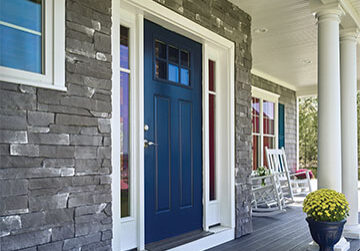DOOR FAQ

There are several types of residential doors, each offering unique features in terms of style, functionality, and material. Here are the most common types:
1. Entry Doors (Front Doors)
-
Single Entry Door: A standard, single-door design often used for the front of the house.
-
Double Entry Doors: These are two doors side by side, usually for larger or more elegant entryways.
-
French Doors: Double doors with large glass panes that allow natural light to enter, often used as an entrance to patios or gardens.
2. Patio Doors
-
Sliding Patio Doors: A common choice for backyards, these doors have one stationary panel and another that slides open.
-
French Patio Doors: These double doors swing open, providing a more traditional look to your patio or backyard entrance.
3. Storm Doors
-
Full-View Storm Doors: These doors provide extra protection and have full glass panels.
-
Half-View Storm Doors: These offer a mix of glass and a solid lower portion, often used for additional insulation or privacy.
4. Security Doors
-
Metal Security Doors: These doors are built with durable metal materials and often feature a reinforced frame and additional locking mechanisms for extra security.
-
Screen Doors: These are installed in front of exterior doors to provide ventilation and keep insects out while still allowing airflow.
5. Sliding Glass Doors
-
These are large glass doors that slide open and are often used in places where a larger opening is needed, such as a balcony or backyard.
If your door is showing signs of significant wear, damage, or inefficiency, it might be time for a replacement. Here are a few key indicators:
-
Visible Damage: Cracks, holes, or severe warping that affect the door’s appearance or function.
-
Difficulty Opening/Closing: If your door sticks, squeaks, or doesn’t close properly, it may be beyond repair.
-
Energy Loss: If your door is drafty or allowing air leaks, it may not be providing proper insulation, leading to higher energy bills.
-
Security Concerns: If the door is compromised, either through damage or outdated locks, it’s important to replace it for safety reasons.
-
Outdated Style: If you're looking to upgrade the look of your home, a new door can instantly enhance your curb appeal and overall aesthetic.
If any of these issues sound familiar, replacing your door could be a great option!
1. Steel Doors
-
Durability & Security: Strong and secure, difficult to break down.
-
Energy Efficiency: Often insulated to help with temperature control.
-
Low Maintenance: Resistant to warping, cracking, and swelling.
2. Fiberglass Doors
-
Energy Efficiency: Excellent insulation properties.
-
Low Maintenance: Won't warp, crack, or swell.
-
Durability: Resistant to dents and scratches.
-
Versatility: Can mimic the look of wood.
3. Wood Doors
-
Aesthetic Appeal: Elegant, customizable, and adds curb appeal.
-
Customizability: Can be stained, painted, or finished to match any style.
-
Insulation: Naturally insulating.
4. Aluminum Doors
-
Lightweight & Strong: Resistant to corrosion.
-
Low Maintenance: Does not warp, crack, or swell.
-
Energy Efficiency: Comes with insulating features.
5. Glass Doors (with Frames)
-
Natural Light: Allows a lot of light into the home.
-
Modern Look: Sleek and open appearance.
-
Energy Efficiency: Double- or triple-glazed options provide good insulation.
6. Composite Doors
-
Strength & Durability: Offers the best features of wood, fiberglass, and steel.
-
Low Maintenance: Resistant to warping, cracking, and swelling.
-
Energy Efficiency: Highly energy-efficient due to insulation.
-
Aesthetic Flexibility: Available in various styles and can look like wood.
These materials provide a range of benefits, from enhanced security and energy efficiency to low maintenance and aesthetic appeal.
Exterior doors typically last between 20 to 50 years, depending on the material and maintenance. Steel and fiberglass doors can last 30 to 50 years due to their durability and low maintenance needs. Wood doors generally last 20 to 30 years but require regular maintenance to prevent damage from weathering. Aluminum doors can last 20 to 40 years, while composite doors, offering a blend of durability and low maintenance, also last 30 to 50 years. Glass doors usually last 20 to 30 years, depending on the quality of the frame and glass. Climate, maintenance, and installation quality also play a role in determining a door's lifespan.
The best exterior doors for energy efficiency are fiberglass and steel doors with foam insulation, as they provide excellent insulation and help regulate indoor temperatures. Composite doors also offer great thermal performance with minimal maintenance. For doors with glass, those with Low-E (low emissivity) glass are ideal, as they reduce heat transfer while letting in natural light.
Have more questions? Feel free to give us a call!
